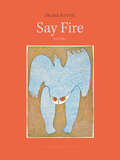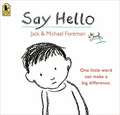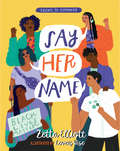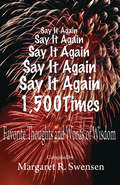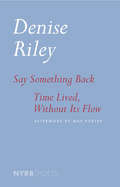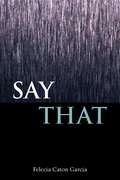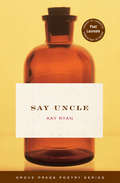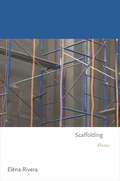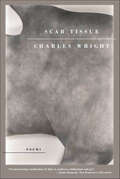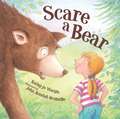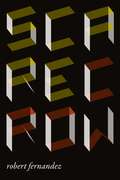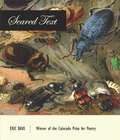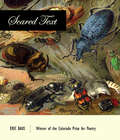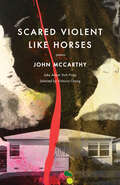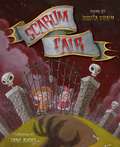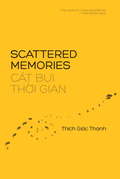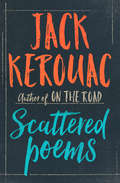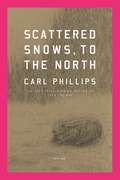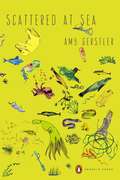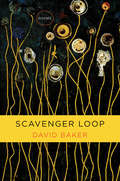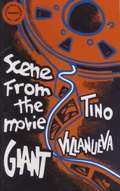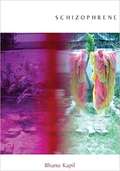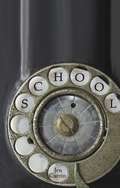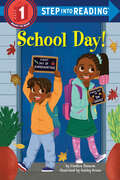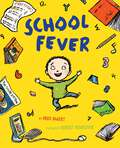- Table View
- List View
Say Fire
by Selma AsoticBosnian poet Selma Asotić&’s fearless debut on memory and resistanceIn a pocket, Asotić finds a brood of planets. In the wind, a cathedral of voice. And in the throat, a thorn bush hums. She slakes her thirst with briny water, and later, tucks a thorn under the tongue. Ready to speak. The poet&’s voice is warm with questions, recursions, and doubts. &“Do you remember nothing from your life?&” she asks, observing the challenge of memory and family history in the wake of the Bosnian War. The poet recalls men returning from war, with bodies no bigger than marbles in a palm. A bullet may pierce through a door and become a peephole. Through it, Asotić can see the myths of war – that shrapnel makes men celestial – or fragments of her own mayhemmed matrilineage. Her lines, blossoming and chimeric, search for a home, and a mother, in peacetime. Her language is alchemized into the corporeal, illumining the bodies that touch and leave us, like waves washing away their gestures.
Say Hello (Fountas & Pinnell LLI Blue: Level G #Level G)
by Michael Foreman Jack ForemanA lone dog comes upon a group of kids playing ball and with leaping ease, joins the game. They’re all having so much fun, they don’t see a sad little boy standing off by himself. Who will spy the boy and invite him to play? With arresting images by a master illustrator and a simple, touching text by his son, SAY HELLO evokes the joy and relief of finding a new friend just when it’s needed the most.
Say Her Name
by Zetta ElliottInspired by the #SayHerName campaign launched by the African American Policy Forum, these poems pay tribute to victims of police brutality as well as the activists insisting that Black Lives Matter. Elliott engages poets from the past two centuries to create a chorus of voices celebrating the creativity, resilience, and courage of Black women and girls.This collection features forty-nine powerful poems, four of which are tribute poems inspired by the works of Lucille Clifton, Audre Lorde, Nikki Giovanni, and Phillis Wheatley. This provocative collection will move every reader to reflect, respond-and act.
Say It Again 1,500 Times: Favorite Thoughts and Words of Wisdom
by Margaret SwensenMargaret Swensen loved to be outdoors, but she was not a hiker or an angler; she was first a mother and a quilter, but at 55 years old she did all the research, even hiked many of the trails, and wrote the Hiker's Guide to Alaska; and did all the research and wrote most of the Angler's Guide to Alaska. She compiled and published the poems of her grandfather, Willis Eugene Robison, in the book As Life Passes. Margaret loved words and she loved writing. Say It Again, 1,500 Times is the compilation of the expressions that governed her life. It's the stuff she used to train her children, teach classes, and incorporated in life's tales she enjoyed tellin--and others enjoyed hearing. Say It Again, 1,500 Times is truly Margaret's favorite thought and words of wisdom.
Say Something Back & Time Lived, Without Its Flow
by Denise RileyA moving meditation on grief and motherhood by one of Britain's most celebrated poets.Say Something Back will allow readers to see just why Denise Riley has been held in such high regard by her fellow poets for so long. The book reproduces A Part Song, a profoundly moving document of grieving and loss, and one of the most widely admired long poems of recent years. Elsewhere these poems become a space for contemplation of the natural world and of physical law, and for considering what it is to invoke those who are absent. But finally, they extend our sense of what the act of human speech can mean—and especially what is drawn forth from us when we address our dead. Lyric, intimate, acidly witty, unflinchingly brave, Say Something Back—which also includes a powerful new prose meditation about grief and its aftermath, &“Time Lived, Without Its Flow&”—is a deeply moving book by one of our finest poets, and one destined to introduce Riley&’s name to a wide new readership.
Say That (Mary Burritt Christiansen Poetry Series)
by Felecia Caton GarciaCaton Garcia&’s poems layer sound and image to offer a tangible point of access into the complex and often contradictory ideas contained within the work. Love, loss memory, and the hidden lives of a range of speakers and characters become the interwoven themes of this book, each presented in raw and unflinching narrative and metaphor. Say That is divided into two sections. The first presents the lived experience of the speakers, while the second strips the &“story&” to unveil a dreamlife where memory and history haunt the lives they lead.
Say Uncle (Grove Press Poetry Series)
by Kay Ryan&“A poetry collection that marries wit and wisdom more brilliantly than any I know&” by the Pulitzer Prize–winning former US Poet Laureate (Jane Hirshfield, author of Come, Thief). Filled with wry logic and a magical, unpredictable musicality, Kay Ryan&’s poems continue to generate excitement with their frequent appearances in The New Yorker and other leading periodicals. Say Uncle, Ryan&’s fifth collection, is filled with the same hidden connections, the same slyness and almost gleeful detachment that has delighted readers of her earlier books. Compact, searching, and oddly beautiful, these poems, in the words of internationally acclaimed poet and writer Dana Gioia, &“take the shape of an idea clarifying itself.&” &“The first thing you notice about her poems is an elbow-to-the-ribs playfulness.&” —San Francisco Chronicle &“The short lines and quick images—almost snapshots—are elemental. Ryan puts them together, then pulls them apart, and twists them in playful fashion, as though she were an alchemist with a modern experimental attitude . . . Truly short-line, one-stanza (for the most part) wonders: full-brained poems in a largely half-brained world.&” —Kirkus Reviews &“Witty, charming, serious and delightful . . . her tight structures, odd rhymes and ethical judgments place her more firmly in the tradition of Marianne Moore and, latterly, Amy Clampitt. Those poets, though, wrote many kinds of poems: Ryan, in this volume, writes just one kind. It is, however, a kind worth looking out for—well crafted, understated, funny and smart.&” —Publishers Weekly
Scaffolding: Poems
by Eléna RiveraScaffolding is a sequence of eighty-two sonnets written over the course of a year, dated and arranged in roughly chronological order, and vividly reflecting life in New York City. In this, her third book of poetry, Eléna Rivera uses the English sonnet as a scaffold to explore daily events, observations, conversations, thoughts, words, and memories--and to reflect on the work of earlier poets and the relationship between life and literature.Guided by formal and syllabic constraints, the poems become in part an exploration of how form affects content and how other poets have approached the sonnet. The poems, which are very attentive to rhythm and sound, are often in conversation with historical, philosophical, artistic, and literary sources. But at the same time they engage directly with the present moment. Like the construction scaffolding that year after year goes up around buildings all over New York, these poems build on one another and change the way we see what was there before.
Scar Tissue: Poems
by Charles WrightHard to imagine that no one counts,that only things endure.Unlike the seasons, our shirts don't shed,Whatever we see does not see us,however hard we look,The rain in its silver earrings against the oak trunks,The rain in its second skin.--from "Scar Tissue II"In his new collection, the Pulitzer Prize-winning poet Charles Wright investigates the tenuous relationship between description and actuality--"thing is not an image"--but also reaffirms the project of attempting to describe, to capture the natural world and the beings in it, although he reminds us that landscape is not his subject matter but his technique: that language was always his subject--language and "the ghost of god." And in the dolomites, the clouds, stars, wind, and water that populate these poems, "something un-ordinary persists." Scar Tissue is a groundbreaking work from a poet who "illuminates and exalts the entire astonishing spectrum of existence" (Booklist).
Scare a Bear
by Kathy-Jo WarginScare a Bear. Do you know how to scare a bear? Would you bang pots and pans? Would you rattle some cans? Would you shout? Would you yell? Would you ring a loud bell? Do you know how to scare a bear? How would you scare a bear out of your cabin? Or out of your fishing boat? How about away from your campfire? And what if he climbed in your bunk? Would the bed go kerplunk? From the author-illustrator team who created Moose on the Loose comes yet another example of the high jinks and hilarity that happens when wildlife wanders indoors. In this contest of wills, who will win? And once again, by story's end, young campers will know exactly how to scare a bear!
Scarecrow (Wesleyan Poetry Ser.)
by Robert FernandezTaking Dante and other catalogers of failure and ruin (Baudelaire, Trakl, Rimbaud) as its guiding lights, Scarecrow charts situations of extremity and madness: "Are you / insistent? Are you dead? / Are you guilty? Has your / name been lifted, a vein / of earth from earth?" It also charts the insistence of time's passing and with it the awakening to both new and foreclosed possibilities. What will remain for us after the disaster? How will we rebuild? To whom will we address ourselves and with what voice? Also a love poem, one of desire and hope, Scarecrow aligns a tragic sensibility with a faith in the other and in the redemptive power of forgiveness. Within the beauty and strangeness of this work rests an imperative that captures the directive of poetry at its best: "Present yourself / in the full radiance of captivation." In its mystery and defiance, Robert Fernandez's collection does precisely this. An online reader's companion will be available at robertfernandezsite.wesleyan.edu.
Scared Text
by Eric Baus"Marvelously sustained and densely rhythmic, this tightly constructed whole is built of parts that, at each level, all the way down to the phrase, constitute poems in themselves. Baus manages to keep a cast of words in constant replay until many of them take on the presence of character, and some emerge as characters themselves-Minus and Iris, for instance-keeping the whole on the verge of a narrative project that remains always just barely out of reach, just barely in another world in which language and animal endlessly interleave. Baus has opened a new literary field: the linguistic bestiary, a new zoo where words pace like fauves behind ever-thinning bars." -Cole Swensen, contest judge and author of Greensward, Ours, and The Glass Age
Scared Text (Colorado Prize for Poetry)
by Eric BausWinner of the 2011 Colorado Prize for Poetry Published by the Center for Literary Publishing at Colorado State University
Scared Violent Like Horses: Poems
by John McCarthyIn this poetry collection, the author of Ghost Country deeply examines violent masculinity, driven by a yearning for more compassionate ways of being.McCarthy’s flyover country is populated by a family strangled by silence: a father drunk and mute in the passenger seat, a mother sinking into bed like a dish at the bottom of a sink, and a boy whose friends play punch-for-punch for fun. He shows us a boy struggling to understand pain carried down through generations and how quickly abandonment becomes a silent kind of violence; “how we deny each other, daily, so many chances to care,” and how “we didn’t know how to talk about loss, / so we made each other lose.” Constant throughout is the brutality of the Midwestern landscape that, like the people who inhabit it, turns out to be beautiful in its vulnerability: sedge grass littered with plastic bags floating like ghosts, dilapidated houses with abandoned Fisher Price toys in the yard, and silos of dirt and rust under a sky that struggles to remember the ground below.With arresting lyricism and humility, Scared Violent Like Horses attends to the insecurities that hide at the heart of what’s been turned harsh, offering a smoldering but redemptive and tender view of the lost, looked over, and forgotten.Selected by Victoria Chang as winner of the Jake Adam York PrizePraise for Scared Violent Like Horses“McCarthy’s book of Midwestern threnodies begins in image and ends in solemnity . . . McCarthy’s poems are profluent stories?a joy to marvel at this skill, impressive considering the book’s bleak landscape.” —The Millions“McCarthy has whittled out a sense of freedom from the heartache of the past, and the reader is left with a remarkable vision.” —Booklist“In unshowy, plaintive, quietly delivered language that should not be mistaken for affectless?and that can be stabbed through with surprisingly piercing metaphor—McCarthy vivifies a place and hard way of life too little visited.” —Library Journal“Ultimately, what the reader is left with is a stunning overlap of lost boy and lost landscape glimpsed through the lens of a gifted poet’s magical linguistic and storytelling abilities.” —Victoria Chang“A book that grabs the reader with its insistent lyric beauty.” —Allison Joseph
Scarum Fair
by Jessica Swaim Carol AshleyEnter the Scarum Fair . . . if you dare! Take a ride on the Scary-Go-Round and Teacup Terror, or enter the Coffin Race. Meet The Head, The Hand, and Madame Ratowski, the palm reader who likes to be paid in Swiss cheese. Visit the chiropractic tent of Dr. Crunch, who'll "pulverize your sternum, and disconnect your knee, then move your metatarsals where your tailbone used to be." And unusual food awaits: sample some cat-hair stew, I-scream, and a type-A blood-red punch. Cap off the entertainment with a special event: Count Dracula's wedding.
Scattered Memories
by Giac ThanhPublished here for the first time, these fifty poems, explore his journey from young boy in Vietnam to being a leader in Thich Nhat Hanh's monastic community. The early poems reflect childhood memories of war and destruction yet are also full of romantic and poetic imagery. His later poems convey a profound wisdom and spaciousness of heart. A Zen Master in his own right, he led a life committed to cultivating great compassion and liberation through inner discovery. Light in spirit, loving and wise, sometimes strict, and often humorous, these poems perfectly capture Giác Thanh's clarity, wisdom, and kindness.
Scattered Poems: Scattered Poems, The Scripture Of The Golden Eternity, And Old Angel Midnight (City Lights Pocket Poets Ser.)
by Jack KerouacJust as he upended the conventions of the novel with On the Road, Jack Kerouac revolutionized American poetry in this ingenious collection Bringing together selections from literary journals and his private notebooks, Jack Kerouac&’s Scattered Poems exemplifies the Beat Generation icon&’s innovative approach to language. Kerouac&’s poems, populated by hitchhikers, Chinese grocers, Buddhist saints, and cultural figures from Rimbaud to Harpo Marx, evoke the primal and the sublime, the everyday and the metaphysical. Scattered Poems, which includes the playfully instructive &“How to Meditate,&” the sensory &“San Francisco Blues,&” and an ode to Kerouac&’s fellow Beat Allen Ginsberg, is rich in striking images and strident urgency. Kerouac&’s widespread influences feel new and fresh in these poems, which echo the rhythm of improvisational jazz music, and the centuries-old structure of Japanese haiku. In rebelling against the dry rules and literary pretentiousness he perceived in early twentieth-century poetry, Kerouac pioneered a poetic style informed by oral tradition, driven by concrete language with neither embellishment nor abstraction, and expressed through spontaneous, uncensored writing.
Scattered Snows, to the North: Poems
by Carl PhillipsAn arresting study of memory, perception, and the human condition, from the Pulitzer Prize winner Carl Phillips. Carl Phillips’s Scattered Snows, to the North is a collection about distortion and revelation, about knowing and the unreliability of a knowing that’s based on human memory. If the poet’s last few books have concerned themselves with power, this one focuses on vulnerability: the usefulness of embracing it and of releasing ourselves from the need to understand our past. If we remember a thing, did it happen? If we believe it didn’t, does that make our belief true? In Scattered Snows, to the North, Phillips looks though the window of the past in order to understand the essential sameness of the human condition—“Tears / were tears,” mistakes were made and regretted or not regretted, and it mattered until it didn’t, the way people live until they don’t. And there was also joy. And beauty. “Yet the world’s still / so beautiful . . . Sometimes // it is . . .” And it was enough. And it still can be.
Scattered at Sea
by Amy GerstlerA dazzling new collection from an award-winning poetAmy Gerstler has won acclaim for sly, sophisticated, and subversive poems that find meaning in unexpected places. The title of her new collection, Scattered at Sea, evokes notions of dispersion, diaspora, sowing one's wild oats, having one's mind expanded or blown, losing one's wits, and mortality. Making use of dramatic monologue, elegy, humor, and collage, these poems explore hedonism, gender, ancestry, reincarnation, bereavement, and the nature of prayer. Groping for an inclusive, imaginative, postmodern spirituality, they draw from an array of sources, including the philosophy of the ancient Stoics, diagnostic tests for Alzheimer's disease, 1950s recipes, the Babylonian Talmud, and Walter Benjamin's writing on his drug experiences.
Scavenger Loop: Poems
by David BakerFrom eco-poetics to the erotic, Scavenger Loop measures the dimensions of the pastoral and the elegy in contemporary lyric poetry. In this masterful new work by "the most moving and expansive poet to come out of the American Midwest since James Wright" (Marilyn Hacker), David Baker constructs a layered natural history of his beloved Midwest and traces the complex story of human habitation from family and village life to the evolving nature of work and the mysterious habitats of the heart. At the center of Scavenger Loop is a sustained investigation of cycles and the natural recycling of things, and a discovery that even out of the discarded and the lost may come rebirth and renewal. In the process Baker reveals how everything bears the potential to be both invasive and life-giving: plants that beautify and conquer, chemicals that heal and destroy, words that mislead and instruct. Widely praised for his "impeccable formalism" (Booklist), Baker pushes to new stylistic methods, moving fluidly between unity and disorder, working at times in sustained narratives and intricate syllabics, at other times in fragments, cross-outs, and erasures. These poems praise and sing but are also clear-eyed in their documentation of destruction, the loss of human livelihood and natural habitat, the spreading threat of agri-business and unchecked development. From eco-poetics to the erotic, Scavenger Loop measures the dimensions of the pastoral and the elegy in contemporary lyric poetry.
Scenes from the Movie Giant
by Tino VillanuevaTino Villanueva recalls a scene from the movie "Giant" in which a Mexican American family is denied service at a restaurant and reflects on how the scene symbolizes the treatment of Mexican immigrants nationwide. His book-length poem captures the pain of feeling, and then forgiving, racism.
Schizophrene
by Bhanu KapilSchizophrene traces the intersections of migration and mental illness as they unfold in post-Partition diasporic communities. Bhanu Kapil brings forward the question of a healing narrative and explores trauma and place through a somatic, poetic and cross-cultural psychiatric enquiry. Who was here? Who will never be here? Who has not yet arrived and never will? Towards an arrival without being, this notebook-book returns a body to a site, the shards re-forming in mid-air: for an instant.
School
by Jen CurrinAt times a call to action and at others an intimate conversation between friends, Currin's sensual and surreal poems speak to the political upheavals and environmental catastrophes of our time. School is an instruction manual for igniting transformation through a collective effort of love and community.
School Day! (Step into Reading)
by Candice RansomIt's time for school in this Step 1 reader featuring the family from Pumpkin Day!, Apple Picking Day!, Garden Day, Snow Day, and Beach Day!The start of the new school year means new friends and new experiences! It's big sister's first day of 3rd grade, but it will be a cinch for her to show little brother the ropes on his first day of kindergarten. She already knows where all the rooms are, who the teachers are, and where to go and when at their school! It's great to have a sibling to rely on when starting something new! A day with family is always a great day! Read all the Day books:Apple Picking DayPumpkin DayGarden DayBeach DaySnow DayGrandparents DayStep 1 Readers feature big type and easy words. Rhymes and rhythmic text paired with picture clues help children decode the story. For children who know the alphabet and are eager to begin reading.
School Fever
by Brod BagertA kid's-eye view of school, crammed with enough funny to fill a big yellow bus!Snappy and hilarious in true Brod Bagert style, these goofy poems are united by their kid authenticity and quirky school themes. From a computer virus that one kid claims is sure to keep him homesick until summer vacation, to the librarian who tames "the savage beast" (a mouse run amok in the library), to a superhero recruited to scare off the school bully, this is most definitely not your typical poetry collection. Robert Neubecker's bright, dynamic artwork propels each poem into another stratosphere of funny. By the end, kids will have contracted a different strain of school fever altogether."Kids will appreciate the humor and will see themselves in the high-energy narrator"—Booklist
